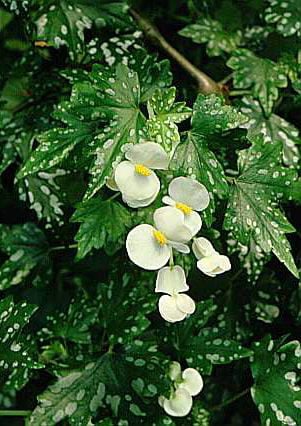Begonia dregei (T)
maple leaf begonia
A tuberous-rooted begonia with tall, brittle stems to 75cm, bearing maple-like green leaves, reddish beneath and sometimes silver-spotted; flowers single, white, 1.5cm across, in late summer
Other common names
grape-leaf begoniaSynonyms
Begonia richardsianaBegonia sinuata Otto & A. Dietr.
see moreBegonia favargeri
Begonia uncinata
Begonia partita
Begonia richardsoniana
Begonia homonyma
Begonia rubicunda
Begonia parvifolia
Begonia sinuata Graham
Begonia rudatisii
Begonia natalensis
Begonia dregei var. partita

Buy this plant
Size
Ultimate height
0.5–1 metresTime to ultimate height
2–5 yearsUltimate spread
0.1–0.5 metresGrowing conditions
Moisture
Moist but well–drained, Well–drainedpH
Acid, NeutralColour & scent
| Stem | Flower | Foliage | Fruit | |
| Spring | ||||
|---|---|---|---|---|
| Summer | White | Green Grey Silver | ||
| Autumn | ||||
| Winter |
Position
- Partial shade
Aspect
South–facing or East–facing
Exposure
Sheltered Hardiness
H1BBotanical details
- Family
- Begoniaceae
- Native to GB / Ireland
- No
- Foliage
- Evergreen
- Habit
- Bushy
- Potentially harmful
- Ornamental bulbs - not to be eaten. Wear gloves and other protective equipment when handling. Pets: Ornamental bulbs - not to be eaten - see the HTA guide to potentially harmful plants for further information and useful contact numbers
- Genus
Begonia can be annuals, evergreen or deciduous perennials or shrubs, with fibrous, tuberous or rhizomatous roots and usually asymmetrical leaves, often strikingly patterned, and small or large flowers, both male and female in the same cluster
- Name status
Correct
- Horticultural Group
- Tuberhybrida begonias are bushy tuberous perennials with glossy leaves and usually double flowers in small clusters in summer; most are dormant in winter
- Plant range
- S Africa
How to grow
Cultivation
Under glass grow in light, well-drained peat-free potting compost in bright filtered light with shade from hot sun at an optimum of 19°C. Provide good ventilation and reduce humidity when flowering. Water moderately when in growth and apply a balanced liquid fertiliser at alternative waterings. Lift tubers in autumn and store in a cool, dry, frost-free place. Replant in spring, hollow side uppermost, at 16 to 18°C. See Begonias: houseplants for further advice.
Propagation
Propagate by seed
Suggested planting locations and garden types
- Patio and container plants
Pruning
No pruning required
Pests
May be susceptible to caterpillars, mealy bugs, mites, glasshouse thrips, vine weevil and aphids
Diseases
May be susceptible to grey moulds, powdery mildews, stem rot and rhizome rot
Get involved
The Royal Horticultural Society is the UK’s leading gardening charity. We aim to enrich everyone’s life through plants, and make the UK a greener and more beautiful place.